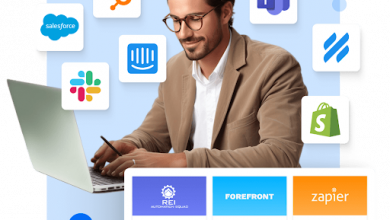How Can Startups Harness AI for Innovative Product Development?

In the fast-paced world of startups, leveraging artificial intelligence can be a game-changer for product innovation. We’ve gathered insights from CTOs and CEOs on how to effectively harness AI, with examples ranging from consumer experiences to streamlining product development workflows. Discover how these ten industry leaders are transforming their strategies with AI for a competitive edge.
- Enhance Consumer Experiences with AI
- AI Powers Healthcare Chatbot Innovation
- AI Generates Multilingual Executive Summaries
- Synthetic Focus Groups Optimize Product Launch
- AI Transforms Social Media Monitoring
- Incorporate AI or Risk Being ‘Steamrolled’
- Optimize Designs with AI Analysis
- Build AI-Driven Financial Advisory Platforms
- AI Optimizes Cross-Border Payment Systems
- AI Streamlines Product Development Workflow
Enhance Consumer Experiences with AI
AI-driven applications offer startups a powerful tool to enhance consumer experiences by creating more intuitive and responsive products. By integrating AI, startups can provide personalized experiences, predictive functionalities, and smarter interactions that meet the evolving expectations of modern consumers.
Meanwhile, AI-augmented software engineering boosts development productivity by automating routine tasks, optimizing workflows, and improving accuracy, which reduces the development cycle and frees up creative energies for innovation.
Implementing these technologies through an internal developer platform (IDP) can further streamline these processes, ensuring that both the development team and end-users benefit from smoother, more effective product rollouts. This integrated approach is often more efficient, helping startups maintain a competitive edge in fast-paced markets.
Asanka Abeysinghe, CTO, WSO2, LLC
AI Powers Healthcare Chatbot Innovation
Startups can effectively harness AI for innovative product development by identifying market needs and leveraging AI technologies like machine learning and natural language processing.
For instance, consider a startup in the healthcare sector developing a virtual health assistant chatbot. This chatbot employs AI algorithms to understand patient queries, provide medical advice, schedule appointments, and even offer personalized health recommendations.
By integrating AI, the startup not only streamlines healthcare services but also improves patient engagement and accessibility to healthcare resources. This example illustrates how startups can utilize AI to develop innovative products that address specific market demands and enhance user experiences.
Prashant Tandon, CTO, Cozy Vision Technologies Pvt. Ltd.
AI Generates Multilingual Executive Summaries
As a startup SaaS company, operating at scale with a global reach presents a significant hurdle. Our platform is used to measure how people really feel about a subject, based on neuropsychology, and communicating the complex data was challenging, even when considering just the local market.
We solved the problem by using a generative AI to produce natural-language Executive Summaries of the data, translating them into all major languages, and then visualizing the summaries using a very realistic AI avatar. Customers love it because it makes the data understandable and accessible.
We took an experimental, iterative approach and increased the sophistication of how we used AI as we became more confident in it and developed greater awareness of the strengths and weaknesses. Because AI can produce quickly, repetitively, and very cheaply, we could afford to throw away failed experiments—that is AI’s greatest strength, in my opinion.
Simon Stapleton, CEO and CTO, Truthsayers Neurotech
Synthetic Focus Groups Optimize Product Launch
As an AI consultant specializing in the food industry, I’ve seen the transformative power of synthetic focus groups in CPG product development. One of my clients, a snack-food company, was developing a new line of plant-based protein bars. By leveraging AI-driven synthetic focus groups, they were able to gather rapid consumer insights and optimize their product before launch.
The process began by creating detailed consumer personas based on the company’s target audience. These personas were then fed into an AI-driven platform that generated a diverse panel of virtual participants, each mimicking real-world consumers with unique backgrounds, opinions, and behaviors.
The company presented their protein bar concepts to the synthetic focus group, including flavors, packaging designs, and marketing messages. The AI simulated authentic consumer responses, analyzing sentiment, detecting patterns, and uncovering valuable insights that traditional focus groups might have missed.
For instance, the synthetic focus group revealed that the proposed packaging design failed to communicate the protein content effectively and that a specific flavor combination was more appealing to a particular age group. These insights allowed the company to iterate on their product design and marketing strategies quickly.
By running multiple synthetic focus group sessions with different product variations, the snack-food company optimized their protein bars based on data-driven consumer feedback. As a result, they reduced development timelines and increased the likelihood of a successful product launch.
The key takeaway is that synthetic focus groups powered by AI enable CPG companies to gather consumer insights rapidly, cost-effectively, and at scale. To implement this in your own product development process, start by defining clear target personas and partnering with AI experts who understand your industry. Embrace an iterative approach, using the insights gained from synthetic focus groups to refine your product concepts and marketing strategies. By leveraging this innovative technology, you can drive innovation, mitigate risk, and develop products that truly resonate with your target audience.
Meg Faibisch Kuhn, Founder, Aioli
AI Transforms Social Media Monitoring
I am proud to call my once-startup, Brand24, the most successful firm in my country when it comes to harnessing AI possibilities. We started out as a group of analytical minds, trying to make sense of sentiment and brand reputations online. AI was the first step that allowed us to create an automated product that can serve people in more than 150 countries around the world.
Let me explain how I did it.
We use AI for more efficient social media monitoring and sentiment analysis. Now our workers can focus on more actionable insights into brand reputation and customer engagement. If you are small and understaffed, AI is the key to making that big step from startup to a firm. I saw AI as an opportunity to improve operational efficiency and enhance user experience, but most importantly, grow exponentially in terms of client range.
Now we go through huge datasets quickly, gauging sentiment, and pinpointing influential voices within online conversations. AI lets us be more than a data-tracking SaaS. We can deliver strategic insights that enable companies to act swiftly and effectively in managing their reputations. All within seconds. No human could do it.
For any startup that wants to integrate AI into their product offerings, my advice is to make the best choice in terms of what need the technology addresses within the market. Use it to create something that isn’t there yet. AI should seamlessly improve the user experience without making the product overly complex. You can expect a large positive feedback, which is crucial for iterative development.
Other than this, the process of integrating AI should include a focus on continuous improvement. Track how the product is doing; there are going to be many changes to be made every day, week, month! This iterative process helps in refining AI functionalities, making the product more robust and responsive to user needs. Startups must also maintain high standards of data quality and uphold stringent privacy protocols, especially when dealing with sensitive customer information.
Mike Sadowski, Founder and CEO, Brand24
Incorporate AI or Risk Being ‘Steamrolled’
Sam Altman recently said in an interview that they will “steamroll” any company that assumes AI will not get smarter. Now we know that he was thinking of GPT-4 when he said that. That changed everything. Startups need to use the latest and greatest AI to survive.
WebDigital is a free website and application development platform. We saw a 100% increase in active users after incorporating AI features to generate text/images, HTML/CSS blocks, and customize website templates. This is not just hype. AI helps people build content more easily.
I recommend thinking about how the AI-powered future looks for your company before implementing any new features in your product. We may not be “surfing the web” in the future. Phone “apps” may evolve into an “AI shell.” Browsers may be a thing of the past. Robots are probably 10-15 years away at most. You have to embrace AI and adapt; otherwise, you will be “steamrolled.”
Cagdas Ucar, CTO, WebDigital
Optimize Designs with AI Analysis
We use AI to analyze massive datasets on material properties and printing parameters. This lets us predict how a design will perform when printed, helping us identify potential issues early on. We can then use this knowledge to optimize designs for strength, weight, and printability.
This not only saves us time and material waste during prototyping, but also allows us to develop truly innovative products with unique functionalities that traditional manufacturing wouldn’t allow.
Paul Chow, CTO and Co-Founder, 3DGearZone
Build AI-Driven Financial Advisory Platforms
In the era of generative AI and innovation, startups can leverage AI to build end-to-end applications in a fraction of the time. This technological advancement in AI, especially with LLMs, has democratized technology to the extent that it’s no longer a question of who can build a product, but it’s about who can build it faster and better.
As an example, a startup can use LLMs to build an AI-driven financial advisory platform that provides personalized investment recommendations based on a user’s financial goals, risk tolerance, and market trends.
Swagata Ashwani, Principal Data Scientist
AI Optimizes Cross-Border Payment Systems
Startups in the cross-border payments industry can truly revolutionize their offerings by harnessing AI. The approach is to be focused on the specific pain points, such as high fees, slow processing times, and fraud risk. By developing innovative solutions that stand out, they can make a significant impact.
We aim to build a fintech startup that builds an AI-powered system to optimize transaction routes, cutting down on fees and speeding up processing times. Also, we want quicker delivery and quick iteration, where AI really does stand out. Our roadmap involves partnering with global financial institutions to integrate this solution into existing payment systems, ensuring compliance with regulations like AML and KYC. The result? A more cost-effective, faster, and secure way to handle cross-border transactions.
This approach not only addresses the major challenges in the industry but also provides users with personalized financial insights and better value through predictive currency conversions. It’s a game-changer for businesses and consumers engaged in international transactions.
Shubhi Agarwal, Senior Manager – Product, TransFi
AI Streamlines Product Development Workflow
Artificial Intelligence (AI) is a game-changer in product development, offering unparalleled efficiency, accuracy, and innovation across every stage of the process. From market research and trend analysis to prototyping and simulation, AI empowers the streamlining of workflows and unlocks new realms of creativity.
At Agilitas, our designers and product creators leverage prototyping for quicker iteration over design and concepts, along with simulation tools to simulate product performance, behavior, and interactions in virtual environments. This allows designers to test and refine prototypes digitally before physical prototyping, reducing costs and accelerating the development process.
Nirdosh Chouhan, Chief Product and Technology Officer, Agilitas
Related Articles
- How Does AI Contribute to Data-Driven Decision-Making in Startups?
- How Do Businesses Prioritize Innovation in Product Development?





